Czy szukasz recenzji Recipe Card Blocks, która pomoże Ci zdecydować, czy jest to odpowiednia wtyczka do przepisów dla Ciebie?
Dzięki temu wtyczce możesz tworzyć multimedialne karty przepisów zawierające obrazy, przewodniki wideo, instrukcje krok po kroku i linki partnerskie. Twoi czytelnicy mogą wchodzić w interakcję z tymi treściami, publikując komentarze i oceny gwiazdkowe lub udostępniając Twoje przepisy na popularnych platformach mediów społecznościowych.
W tej recenzji Recipe Card Blocks przyjrzymy się tej popularnej wtyczce, aby sprawdzić, czy jest odpowiednia dla Twojej strony WordPress.
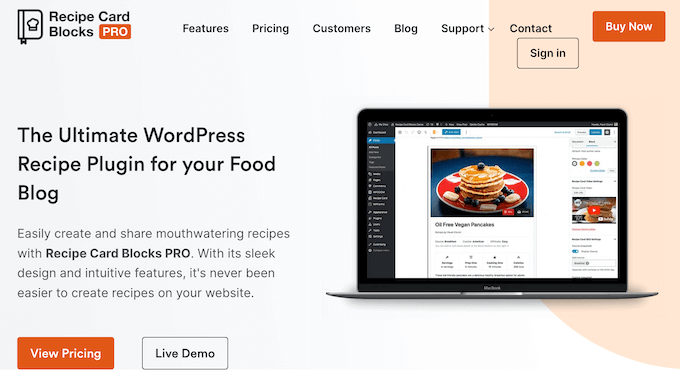
Recipe Card Blocks: Dlaczego warto używać w WordPress?
Recipe Card Blocks to popularna wtyczka, która pozwala na dodawanie kart przepisów do Twojej witryny za pomocą edytora bloków WordPress.
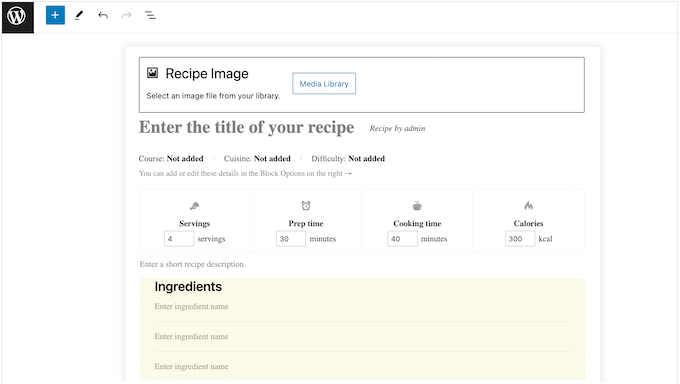
Jest wyposażony w wiele układów kart i proste opcje dostosowywania, dzięki czemu możesz dopracować wygląd swoich kart.
Recipe Card Blocks automatycznie dodaje również dane schematu do Twojej witryny, co zachęci wyszukiwarki do wyświetlania Twoich przepisów jako bogate fragmenty. Pomaga to wyróżnić się w SERPach i często zwiększa ruch na Twoim blogu.
Jeśli dopiero zaczynasz lub masz ograniczony budżet, możesz pobrać lekką wersję Recipe Card Blocks z WordPress.org.
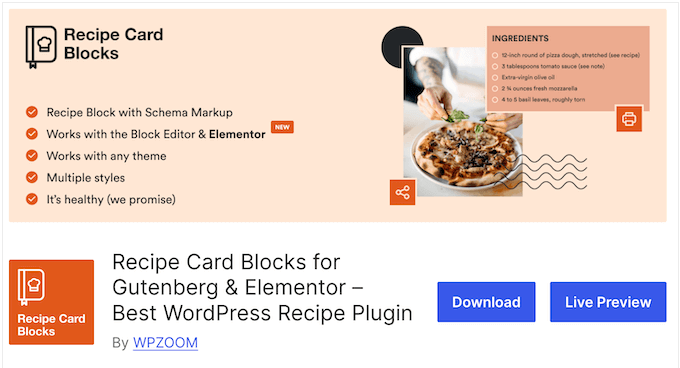
Ten plugin pozwala na tworzenie nieograniczonej liczby kart z obrazami, filmami i informacjami o wartościach odżywczych. Doda również poprawnie sformatowany znaczniki schematu do Twojej witryny, dzięki czemu Twoje przepisy będą częściej pojawiać się w odpowiednich wynikach wyszukiwania.
Jednak wtyczka premium daje odwiedzającym więcej sposobów interakcji z Twoimi treściami. Po pierwsze, mogą zostawić ocenę gwiazdkową i konwertować przepisy między jednostkami amerykańskimi zwyczajowymi a metrycznymi. Mogą również filtrować Twoje przepisy na podstawie takich czynników, jak poziom trudności i kuchnia, co jest idealne dla odwiedzających szukających inspiracji.
Recenzja Recipe Card Blocks: Czy to odpowiedni plugin do przepisów dla Ciebie?
Jeśli prowadzisz bloga kulinarnego, to wtyczka do przepisów może wyświetlać listę składników, filmy, obrazy i informacje o wartości odżywczej w ładnym układzie. Pomaga to czytelnikom śledzić Twoje instrukcje i z łatwością gotować coś pysznego.
Może to poprawić doświadczenie czytelnika, co zmniejszy współczynnik odrzuceń i sprawi, że ludzie będą wracać na Twojego bloga kulinarnego. Mając to na uwadze, zobaczmy, czy wtyczka Recipe Card Blocks jest dla Ciebie odpowiednia.
1. Łatwy w użyciu
Recipe Card Blocks został zaprojektowany z myślą o łatwości użytkowania. Aby zacząć, możesz zainstalować i aktywować go, tak jak każdą inną wtyczkę WordPress.
Po aktywacji, Recipe Card Blocks dodaje nową sekcję do panelu WordPress, gdzie możesz tworzyć tyle przepisów, ile chcesz. W tym edytorze możesz dodawać szczegółowe informacje, w tym wymagane składniki i sprzęt, wielkość porcji, czas przygotowania i obraz wyróżniający.
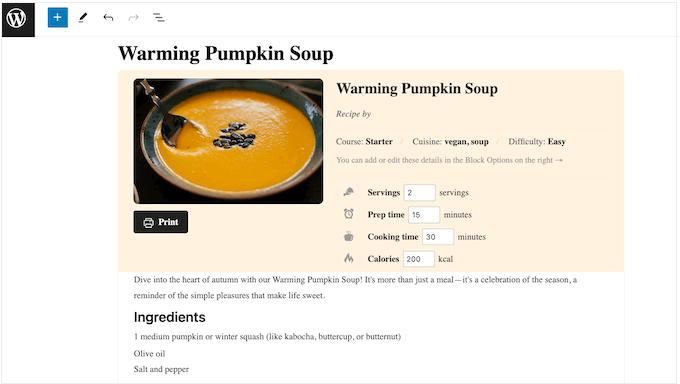
Gdy będziesz zadowolony z konfiguracji przepisu, możesz dodać go do dowolnej strony lub wpisu za pomocą krótkiego kodu, który wtyczka tworzy automatycznie.
W ten sposób możesz wyświetlać ten sam przepis w wielu miejscach bez konieczności ręcznego tworzenia go za każdym razem.
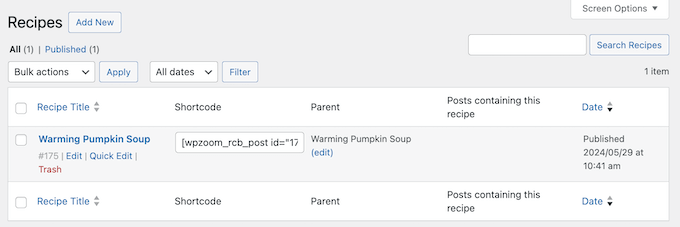
Alternatywnie, możesz tworzyć przepisy w edytorze treści WordPress, używając bloku Recipe Card. Po prostu dodaj ten blok do dowolnej strony, a następnie wpisz informacje, które chcesz użyć.
2. Działa z każdym motywem WordPress
Te karty przepisów są zaprojektowane do współpracy z każdym motywem WordPress. Oznacza to, że Twoje karty będą wyglądać świetnie i działać poprawnie, nawet jeśli zmienisz motyw po dodaniu ich do swojej witryny.
3. W pełni konfigurowalne karty
Dzięki tej wtyczce możesz dostosować swoje karty przepisów, aby idealnie pasowały do Twojej firmy lub personal brandingu, oraz motywu WordPress.
Na początek możesz wybrać spośród 5 różnych stylów kart przepisów.
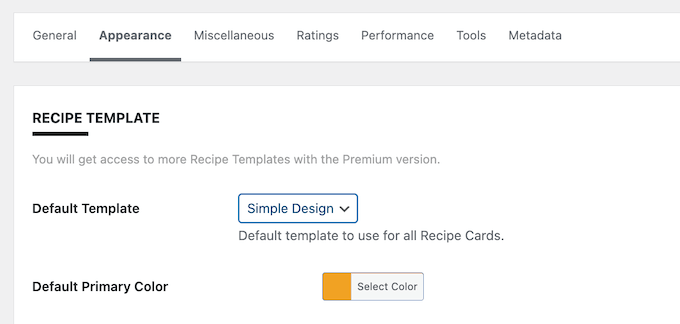
Możesz również zmienić domyślny kolor podstawowy oraz kolor ocen gwiazdkowych.
Niezależnie od tego, jak skonfigurujesz te domyślne ustawienia, możesz je nadpisać dla konkretnych kart. Na przykład, w edytorze treści WordPress możesz przełączać się między różnymi stylami kart przepisów i wybierać dokładnie, jakie informacje chcesz wyświetlić w danej karcie.
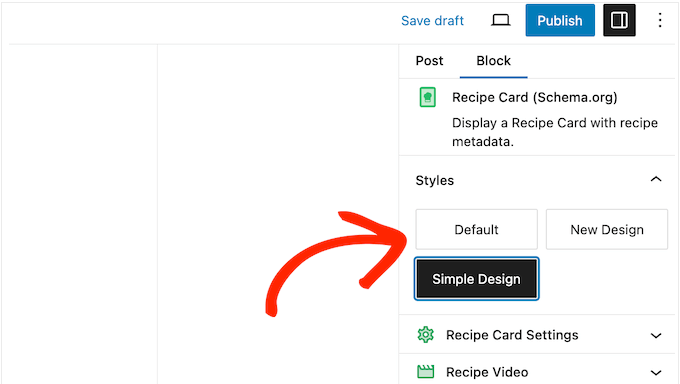
Chcesz wprowadzić bardziej zaawansowane zmiany? Wtyczka Recipe Card Blocks obsługuje również niestandardowy CSS. W ten sposób możesz tworzyć całkowicie unikalne projekty z niestandardowymi czcionkami, własną paletą kolorów i nie tylko.
4. Masowe dodawanie składników i instrukcji
Aby zaoszczędzić czas i wysiłek, Recipe Card Blocks posiada edytor masowy, który pozwala na dodawanie wielu składników i instrukcji jednocześnie. Po prostu dodaj każdy element w osobnej linii, a wtyczka zadba o ich prawidłowe formatowanie.
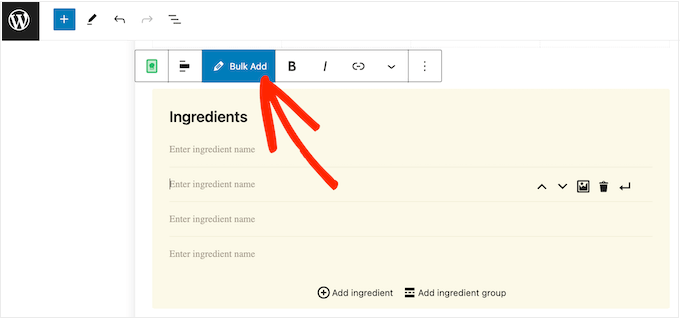
Ta funkcja jest szczególnie przydatna, gdy kopiujesz/wklejasz istniejące przepisy na swojego bloga kulinarnego WordPress.
5. Przyciągające wzrok zdjęcia potraw
Szukając przepisu, większość czytelników najpierw spojrzy na zdjęcia przepisu. Oznacza to, że apetycznie wyglądające zdjęcia są koniecznością dla każdej strony internetowej o tematyce kulinarnej.
Mając to na uwadze, możesz dodać główne, wyróżnione zdjęcie do każdej karty przepisu.
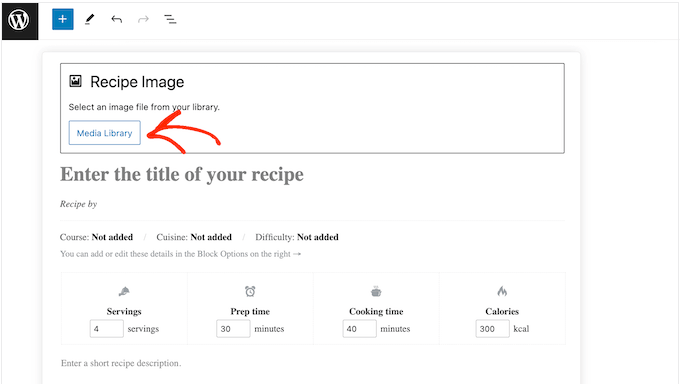
6. Galeria w instrukcjach
Obrazy mogą pomóc czytelnikom zrozumieć kroki, które powinni podjąć, aby wykonać Twój przepis.
Innym razem dodatkowe obrazy mogą po prostu przerywać pisemne instrukcje przepisu lub pomagać przyciągnąć uwagę czytelnika. Na przykład, ładne zdjęcie składników posiłku może przekonać odwiedzających do wypróbowania tego przepisu.
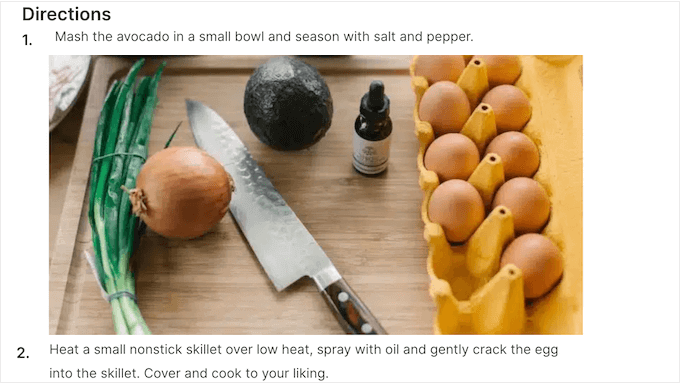
Dobra wiadomość jest taka, że Recipe Card Blocks pozwala na dodanie obrazu do każdego kroku.
Te obrazy są opcjonalne, więc nie musisz dodawać zdjęcia do każdego kroku.
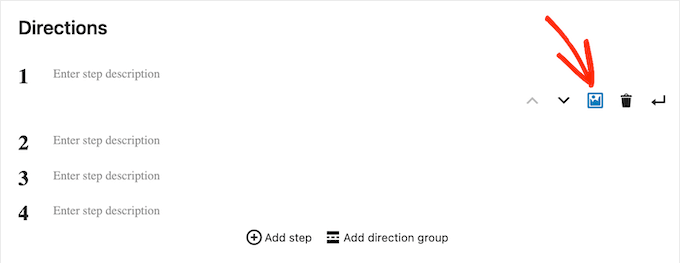
7. Wsparcie dla galerii wideo
Niektórzy odwiedzający mogą woleć obejrzeć film zamiast czytać instrukcje krok po kroku. Mimo to możesz dodać samouczki wideo do swoich kart przepisów.
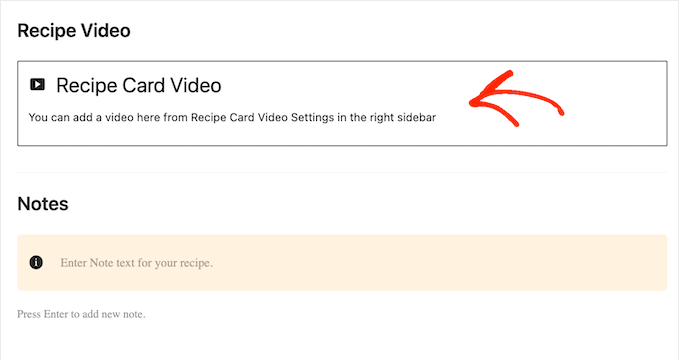
Możesz dodać wideo z biblioteki multimediów WordPress lub osadzić filmy w swojej karcie przepisu za pomocą adresu URL.
Pozwala to odwiedzającym na dostęp do Twoich przepisów w sposób, który im odpowiada. Może to dać Ci przewagę nad stronami z przepisami, które oferują tylko instrukcje tekstowe.
8. Dodaj wezwania do działania w mediach społecznościowych
Zdjęcia i treści związane z jedzeniem są bardzo popularne na platformach mediów społecznościowych . Mając to na uwadze, będziesz chciał zachęcić czytelników do udostępniania Twoich przepisów w mediach społecznościowych.
Zamiast dodawać prosty przycisk udostępniania w mediach społecznościowych, Recipe Card Blocks pozwala dodawać konfigurowalne wezwania do działania w mediach społecznościowych. Pojawiają się one w stopce każdej karty przepisu.
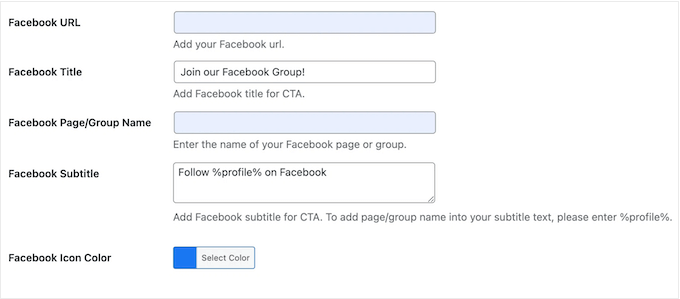
W ustawieniach wtyczki możesz dodać linki do Instagrama, Pinteresta i Facebooka. Następnie możesz wpisać wezwanie do działania, którego chcesz użyć.
Po wykonaniu tej czynności Recipe Card Blocks doda te banery społecznościowe do wszystkich Twoich bloków przepisów.

9. Dodaj informacje o wartości odżywczej
Etykiety z wartościami odżywczymi pomagają czytelnikom podejmować bardziej świadome decyzje dotyczące posiłków, które gotują. Mogą również sprawić, że Twoja strona o jedzeniu będzie bardziej atrakcyjna, zwłaszcza w porównaniu do blogów z przepisami, które nie podają informacji o wartościach odżywczych.
Dzięki Recipe Card Blocks możesz dodawać informacje o wartościach odżywczych do dowolnej karty lub wyświetlać te informacje oddzielnie za pomocą bloku Nutrition Facts.
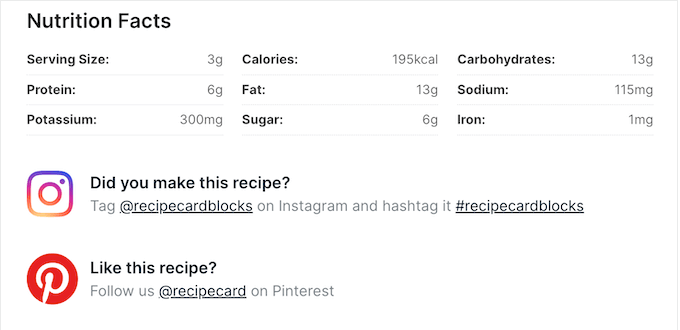
10. Schemat przepisu
Wszystkie przepisy tworzone za pomocą Recipe Card Blocks są zoptymalizowane pod kątem danych strukturalnych Google i zawierają znaczniki schematu przepisów.
Ten schemat przepisu to rodzaj kodu HTML który dostarcza botom wyszukiwarek więcej informacji o Twoich przepisach. Pomaga to wyszukiwarkom takim jak Google zrozumieć Twoje treści i pokazywać je czytelnikom szukającym tego typu treści.
Ponadto wyszukiwarki mogą wykorzystywać te dane o przepisach do tworzenia wyróżnionych fragmentów. Pojawiają się one na górze wyników wyszukiwania i zawierają dodatkowe informacje w przyciągającym wzrok formacie. Na przykład Google może wyświetlać składniki Twojego przepisu, oceny gwiazdkowe, czas przygotowania i inne informacje w wyróżnionym fragmencie.
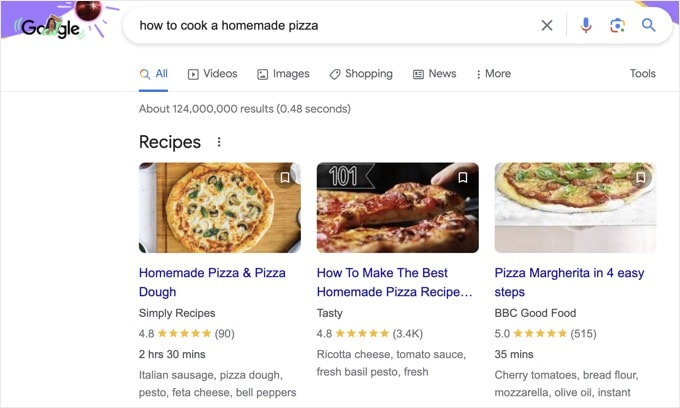
Sprawi to, że Twoje przepisy natychmiast wyróżnią się w wynikach wyszukiwania, a nawet mogą zwiększyć ruch na Twoim blogu.
11. Zgodność z RODO
RODO (Ogólne rozporządzenie o ochronie danych) to prawo Unii Europejskiej (UE), które ma na celu zapewnienie obywatelom UE większej kontroli nad ich danymi osobowymi. Naruszenie tego ważnego prawa o ochronie prywatności może skutkować grzywną lub nawet karą pozbawienia wolności.
Dobra wiadomość jest taka, że Recipe Card Blocks nie zbiera żadnych informacji poza Twoją instalacją WordPress i nie integruje żadnych Google Fonts. Pomaga to w przestrzeganiu RODO i uniknięciu konsekwencji naruszenia tego ważnego prawa o ochronie prywatności.
Jednak funkcja ocen gwiazdkowych przechowuje plik cookie za każdym razem, gdy ktoś oceni Twój przepis. Pomaga to zapobiegać spamowi w ocenach, ale wpływa również na prywatność odwiedzających. W związku z tym zalecamy zaktualizowanie polityki prywatności Twojej witryny, aby było jasne, że w ten sposób używasz plików cookie.
12. Regulowane porcje
Tworząc przepis, możesz określić, ile porcji zostanie wyprodukowanych.
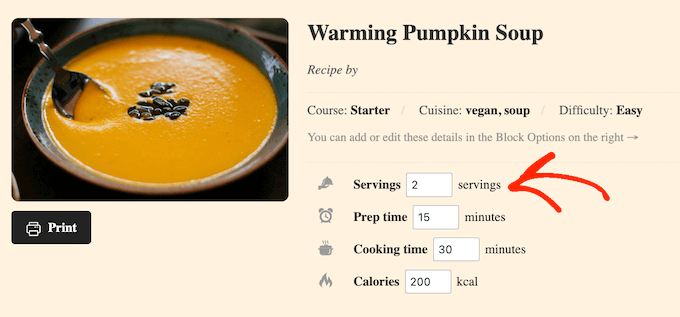
Jednak czasami czytelnicy mogą potrzebować gotować dla większej lub mniejszej liczby osób. Mając to na uwadze, ucieszy Cię wiadomość, że Recipe Card Blocks ma funkcję regulacji liczby porcji, dzięki czemu czytelnik może łatwo dostosować Twoje przepisy.
Gdy czytelnicy zmienią liczbę porcji, lista składników zostanie automatycznie zaktualizowana, aby wyprodukować dokładnie tę liczbę porcji. Eliminuje to zgadywanie podczas gotowania.
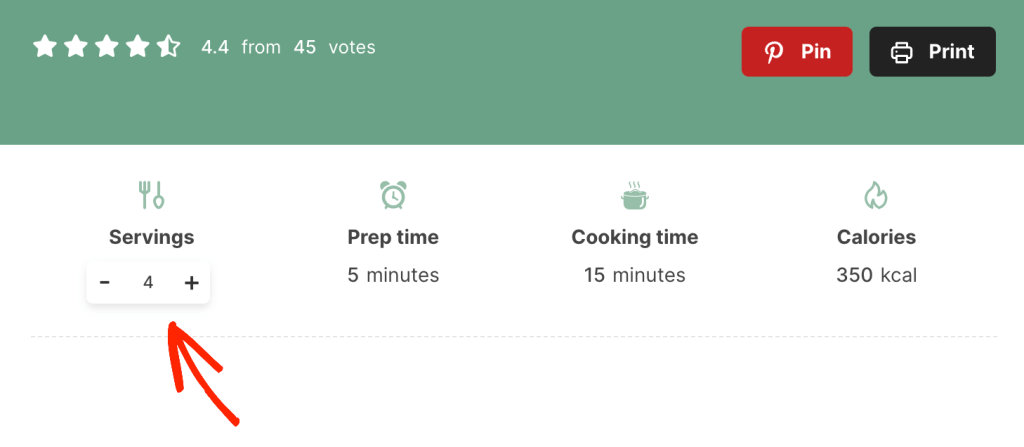
13. Wyświetlaj oceny gwiazdkowe
Ocena gwiazdkowa to prosta forma dowodu społecznego, która może pomóc odwiedzającym znaleźć Twoje najlepsze przepisy. Zachęca również czytelników do interakcji z Twoimi treściami, dając im szybki i łatwy sposób na ocenę Twoich przepisów.
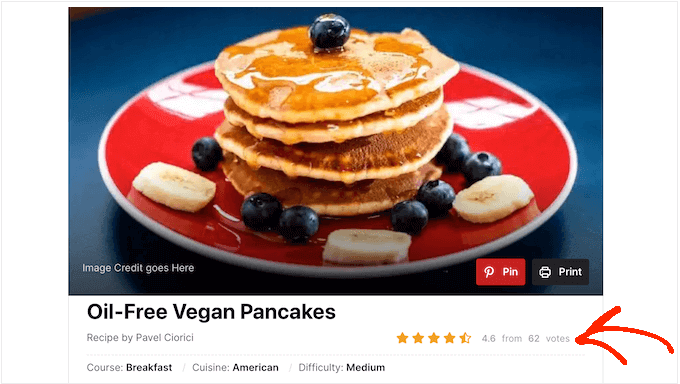
Wtyczka pokazuje również całkowitą liczbę ocen dla każdego przepisu. Duża liczba może przekonać odwiedzających, że Twój blog jest popularny i ma wielu czytelników, co oznacza, że chętniej wypróbują Twoje przepisy.
Co więcej, te oceny gwiazdkowe mają prawidłowy schemat, dzięki czemu częściej pojawiają się w odpowiednich wynikach wyszukiwania (SERP).
14. Akceptuj komentarze czytelników
Podobnie jak w przypadku akceptowania komentarzy na Twoich stronach i postach, odwiedzający mogą komentować Twoje przepisy. Daje im to łatwy sposób na dzielenie się opiniami i wskazówkami lub zadawanie pytań.
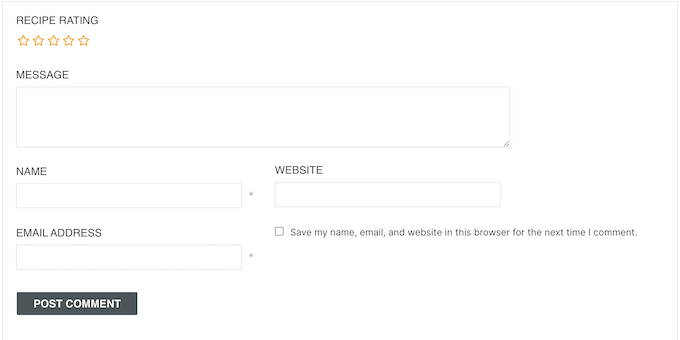
15. Konfigurowalne układy przepisów
Jak już widzieliśmy, możesz dodać całe przepisy do dowolnej strony lub wpisu za pomocą bloku Recipe Card. Jednak ta wtyczka ma również mniejsze bloki, które dodają określony typ treści przepisu do strony. Na przykład istnieje blok Składniki, który dodaje listę składników.
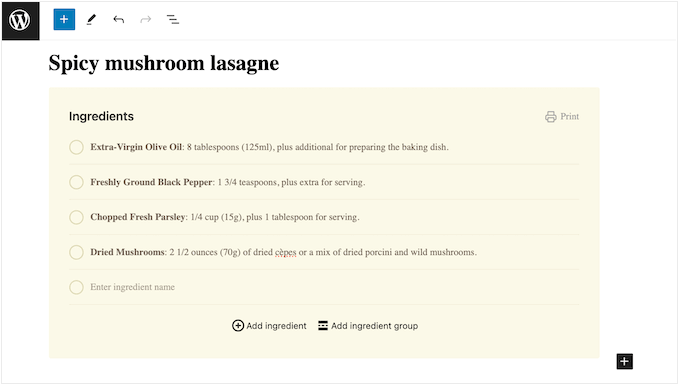
Istnieje również blok „Przejdź do przepisu”, który dodaje pojedynczy przycisk do strony lub wpisu.
Korzystając z tych mniejszych bloków, możesz dokładnie kontrolować, jakie treści przepisu dodajesz do strony. Możesz również wstawić zwykły tekst pomiędzy blokami. Na przykład, możesz napisać wstęp przed dodaniem bloku Składniki do strony.
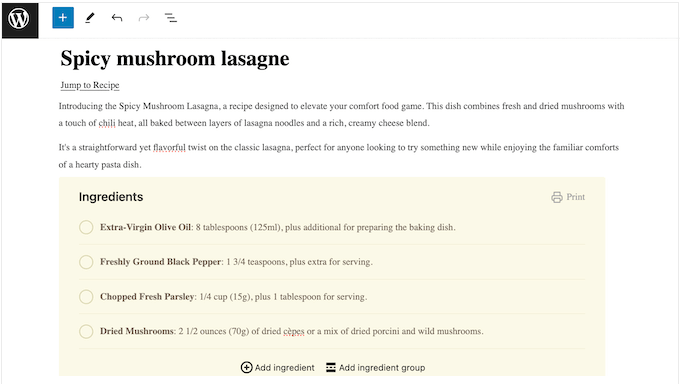
Łącząc te bloki na różne sposoby i starannie pozycjonując je na stronie, możesz tworzyć wszelkiego rodzaju niestandardowe układy dla swojego bloga WordPress.
16. Zarabiaj na marketingu afiliacyjnym
Niektóre przepisy wymagają specjalnego sprzętu. Z tego powodu możesz dodać sekcję „Sprzęt” do swoich kart przepisów, wraz z obrazem przedmiotu, którego będzie potrzebował czytelnik.
Możesz nawet pójść o krok dalej i dodać link afiliacyjny, dzięki czemu czytelnicy będą mogli kupić ten sprzęt.
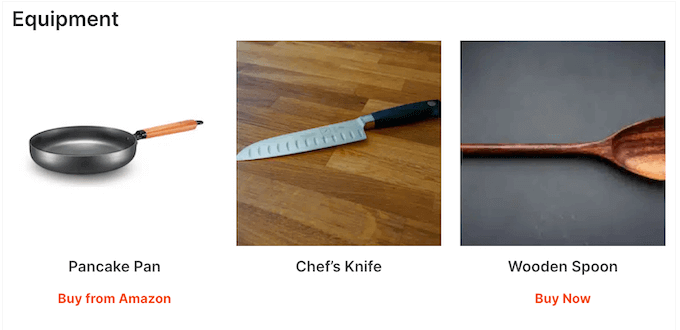
Marketing afiliacyjny to popularny sposób na zarabianie pieniędzy online na blogowaniu z WordPress, więc jest to świetny sposób na monetyzację Twoich przepisów.
Co więcej, możesz dodać każdy element wyposażenia i link afiliacyjny do inwentarza. Następnie możesz dodać te zapisane informacje do dowolnego przyszłego przepisu, za pomocą zaledwie kilku kliknięć. W ten sposób możesz zbudować bibliotekę linków afiliacyjnych, których możesz używać na całej swojej stronie WordPress.
17. Zestawienia przepisów
Czy chcesz tworzyć tematyczne listy przepisów? Na przykład, możesz chcieć wyświetlić swoje najwyżej oceniane przepisy na swojej niestandardowej stronie głównej lub wyróżnić „łatwe” przepisy w poście na blogu skierowanym do początkujących kucharzy.
W takim przypadku możesz użyć bloku Recipe Roundups, aby wyświetlić swoje przepisy w formacie listy.
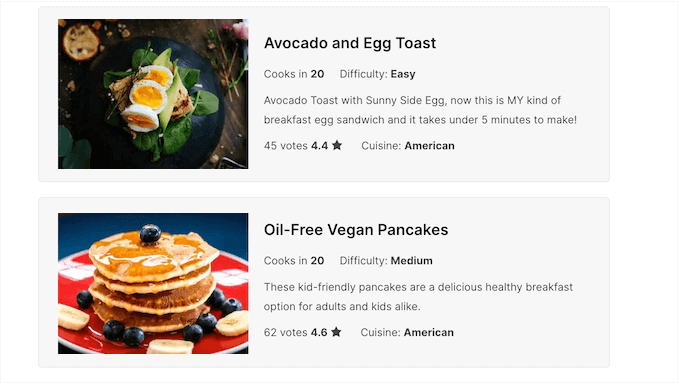
Po dodaniu tego bloku do strony lub wpisu możesz wybrać każdy przepis, który chcesz wyróżnić. Bloki Recipe Card wyświetlą te przepisy w ładnym układzie.
18. Blok indeksu przepisów
Niektórzy czytelnicy mogą nie mieć na myśli konkretnego przepisu i po prostu szukać inspiracji kulinarnej. Aby pomóc im przeglądać Twoją witrynę, ta wtyczka udostępnia blok indeksu przepisów.
Pozwala to czytelnikom filtrować Twoje przepisy według kuchni, rodzaju posiłku lub poziomu trudności.
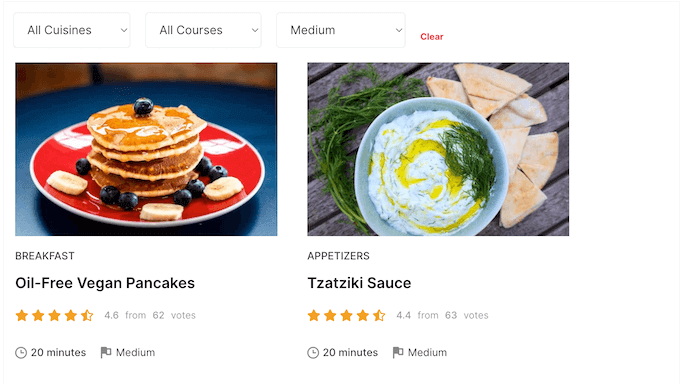
Czytelnicy mogą nawet łączyć wiele filtrów, aby znaleźć idealny dla siebie przepis. Na przykład, mogą szukać „Deseru”, który ma poziom trudności „Łatwy”.
19. Tryb gotowania
Niektórzy czytelnicy mogą chcieć zachować Twój przepis na ekranie podczas jego realizacji. Aby im pomóc, Recipe Card Blocks ma wbudowany Tryb Gotowania, który zapobiega wyłączaniu się ekranu urządzenia.
Czytelnicy mogą włączyć i wyłączyć ten tryb, po prostu klikając przełącznik.
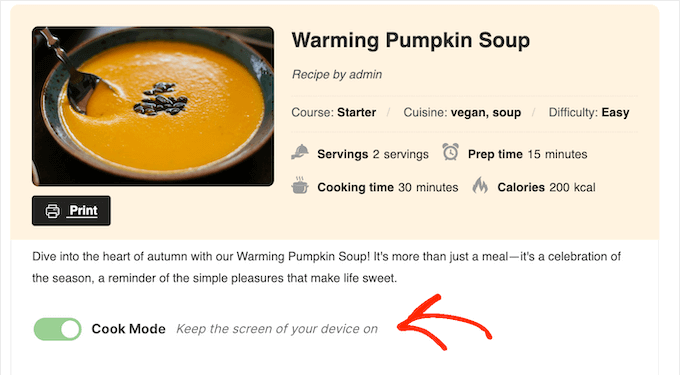
20. Wsparcie Społeczności i Profesjonalne
Recipe Card Blocks zapewnia wszystko, czego potrzebujesz do dodawania przepisów do swojej witryny, w tym wybór bloków, dedykowany edytor przepisów i gotowe układy.
Czasami jednak możesz potrzebować dodatkowej pomocy lub mieć pytania, na które chcesz uzyskać odpowiedź. Na początek dostępna jest internetowa baza wiedzy, w której znajdziesz pomocne samouczki, a także porady, jak naprawić najczęstsze błędy WordPress, które możesz napotkać podczas korzystania z tej wtyczki.
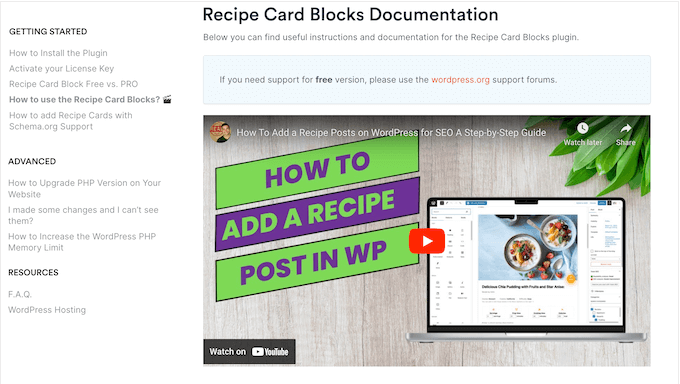
Istnieje również blog, na którym poruszane są różne tematy, takie jak jak zarabiać pieniądze online blogując z WordPress. Znajdziesz tam również wybór niezbędnych wtyczek WordPress, które możesz chcieć użyć na swojej stronie o jedzeniu, wybrany przez zespół ekspertów.
Jeśli korzystasz z darmowej wtyczki, możesz publikować na forum Recipe Card Blocks na WordPress.org i uzyskać odpowiedzi na podstawowe pytania.
Publikując na publicznych forach pomocy technicznej, zawsze warto podać jak najwięcej informacji, aby eksperci mogli w pełni zrozumieć Twój problem i udzielić pomocnej odpowiedzi. Więcej na ten temat znajdziesz w naszym przewodniku jak prawidłowo prosić o wsparcie WordPress.
W międzyczasie, jeśli zaktualizujesz do wersji premium wtyczki, będziesz mieć dostęp do wsparcia e-mail, dzięki czemu możesz uzyskać pomoc indywidualną bezpośrednio od ekspertów.
Recenzja bloków kart przepisów: Ceny i plany
Jeśli dopiero zaczynasz lub masz ograniczony budżet, możesz pobrać darmową wersję Recipe Card Blocks z WordPress.org. Pozwala ona na tworzenie pięknych kart przepisów z obrazami, filmami, listą składników i instrukcjami krok po kroku.
Jednak jeśli chcesz odblokować bardziej zaawansowane funkcje, będziesz musiał zaktualizować wtyczkę do wersji premium.

Do wyboru są 3 plany:
- Starter. Za 59 USD rocznie możesz zainstalować plugin na jednym blogu, stronie internetowej lub sklepie internetowym. Ten plan dodaje blok Recipe Index, dzięki czemu odwiedzający mogą filtrować Twoje przepisy według czynników takich jak kuchnia i poziom trudności. Odblokowuje również Recipe Roundups, dzięki czemu możesz tworzyć wyselekcjonowane listy przepisów i wyświetlać je na swojej stronie w ładnym układzie.
- Profesjonalny. W cenie 79 USD rocznie, ten plan pozwala na używanie Recipe Card Blocks na maksymalnie 3 stronach internetowych. Czytelnicy mogą również konwertować przepisy między jednostkami amerykańskimi (zwykłymi) a metrycznymi, dzięki czemu jest to idealne rozwiązanie, jeśli prowadzisz wielojęzyczną stronę internetową lub chcesz przyciągnąć międzynarodową publiczność.
- Biznes. Za 129 USD rocznie możesz zainstalować Recipe Card Blocks na maksymalnie 10 stronach internetowych. To świetny wybór, jeśli prowadzisz wiele witryn w niszy blogowania kulinarnego. Może to być również dobra opcja dla mniejszych agencji tworzących strony WordPress, które potrzebują rozwiązania, z którego mogą korzystać na stronach swoich klientów.
Recenzja Recipe Card Blocks: Czy to odpowiedni plugin do przepisów dla Ciebie?
Po zapoznaniu się z funkcjami, wsparciem i cenami jesteśmy pewni, że Recipe Card Blocks to świetny plugin do przepisów. Pozwala na tworzenie kart przepisów, które można dostosować, zmieniając kolory, układy i zawartość.
Niezależnie od tego, jak stylizujesz te karty, są one wyposażone w poprawnie sformatowany schemat, który pomoże wyszukiwarkom wyświetlać Twoje przepisy osobom szukającym treści podobnych do Twoich. Gdy czytelnicy odkryją Twoje przepisy, mogą zostawiać komentarze, a nawet oceny gwiazdkowe.
Ponadto możesz wyświetlić listę przepisów w dowolnym miejscu na swojej stronie lub pozwolić czytelnikom filtrować Twoje treści na podstawie takich czynników, jak kuchnia i rodzaj dania.
Mamy nadzieję, że ta recenzja bloków kart przepisów pomogła Ci zdecydować, czy jest to odpowiedni wtyczka do przepisów dla Ciebie. Następnie możesz zapoznać się z naszym przewodnikiem na temat tworzenia niestandardowego kanału zdjęć na Instagramie, lub sprawdzić nasz wybór najlepszego oprogramowania do powiadomień push dla stron internetowych.
Jeśli podobał Ci się ten artykuł, zasubskrybuj nasz kanał YouTube po samouczki wideo WordPress. Możesz nas również znaleźć na Twitterze i Facebooku.

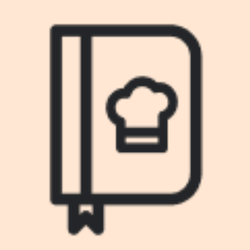

Bloki Karty Przepisu – Opinie użytkowników
Udostępnij swoją recenzję Recipe Card Blocks, aby pomóc innym w społeczności.